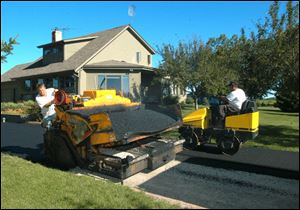
Concrete or asphalt? Choice is on surface
7/20/2003
Tony Morlock, of Morlock Asphalt, runs the paving machine and Josh Miller the roller in Grand Rapids, Ohio.
Pay now or pay later is the key decision homeowners must make when choosing driveway paving material.
Those willing to spend now and save on upkeep later usually pick concrete, say local paving experts. those hoping to put in a driveway for less money will opt for asphalt or blacktop, although the driveway will have to be sealed periodically.
Concrete costs at least twice what asphalt costs, experts say. A typical charge is $1.45 to $2 per square foot for asphalt and $3 to $3.50 per square foot for concrete. The new trend of using color or printing a patterned design in the surface can cost five times as much as a basic asphalt driveway.
“Blacktop will last 18 to 20 years and concrete will last forever, but you're going to pay 2 to 21/2 times more for concrete,” said Bob Wheeler, president of Jennite Co. in Toledo.
The key to driveway durability is how the material is poured into place, said Tony Morlock, of Morlock Asphalt Ltd. near Portage, Ohio, who does cement and asphalt drives.
“If you don't have a good foundation to start with, neither one lasts,” he said. “You'll get cracks in both and if anybody tells you different, they're wrong.”
He prefers to use a base of 10 inches of compacted stone on both types of jobs. “I use a little more than most people, but the blacktop especially holds up real well,” he said.
“If that stone is not stable, nothing is going to stick and you'll get cracks from the bottom up, which then causes the cracks on top.”
The industry standard for asphalt, said Jennite's Mr. Wheeler, is to excavate the site and spread a six-inch stone base, and then apply 21/2 inches of blacktop. For concrete, the standard is four inches of cement poured atop the base in the driveway portion, six to eight inches on the apron leading to the street.
The best time to pour or repave a driveway is from April 1 through November, he said, barring cold, rainy weather.
“You pour asphalt at 250 to 285 degrees, so heat's not going to effect it. But cold weather does and damp soils do,” Mr. Wheeler said. He said cold weather pulls the heat out of the blacktop and it will turn “into one big, solid lump.” Dampness will cause moisture to get trapped in the blacktop, causing it to fail prematurely.
On a typical repaving job, his company will remove the old blacktop on one day, pave it the next, and then tell the homeowner not to drive on the new surface for three days and not to park on it for the balance of a week. Those choosing a concrete driveway will be told to stay off it for 7 to 10 days. Water will be applied to the newly poured surface to make it cure more strongly.
“We recommend concrete in a lot of places because it's more substantial. It's a structural material,” said Bob Baldus, an estimator with Bowers Asphalt & Paving in Lake Township. “But because of the cost, many people lean toward asphalt. It's a very simple process, unless you don't know what you're doing.”
Tom Balas, of Balas Inc. in Toledo, said he has poured concrete driveways for years and usually leaves 18 inches on each side so when drivers get out of their cars they're not stepping on grass.
William Fair, an engineer with Flexible Pavements of Ohio, the state asphalt organization, said state residents have no clear choice on driveway material. Asphalt is the least costly, but cracks need to be sealed, he said.
“Asphalt is an organic substance from petroleum, so when it's hit by air, water, and sunlight, you're going to have to seal the surface or cracks will appear,” he added.
The latest trend in asphalt is called StreetPrint, which is the imprinting of patterns on the surface.
“You can simulate brick pavers, random stone patterns, slate patterns, and border patterns and there're 31 colors that we can use,” said Steve Creager, of Gerken Asphalt Paving Inc., in Napoleon.
His company would charge $5.25 to $6.25 a square foot for a StreetPrint, compared with about $11 a square foot for printed concrete. “We've done municipal streets like Adams Street in Toledo, but we're still trying to catch on in the residential market,” he said.